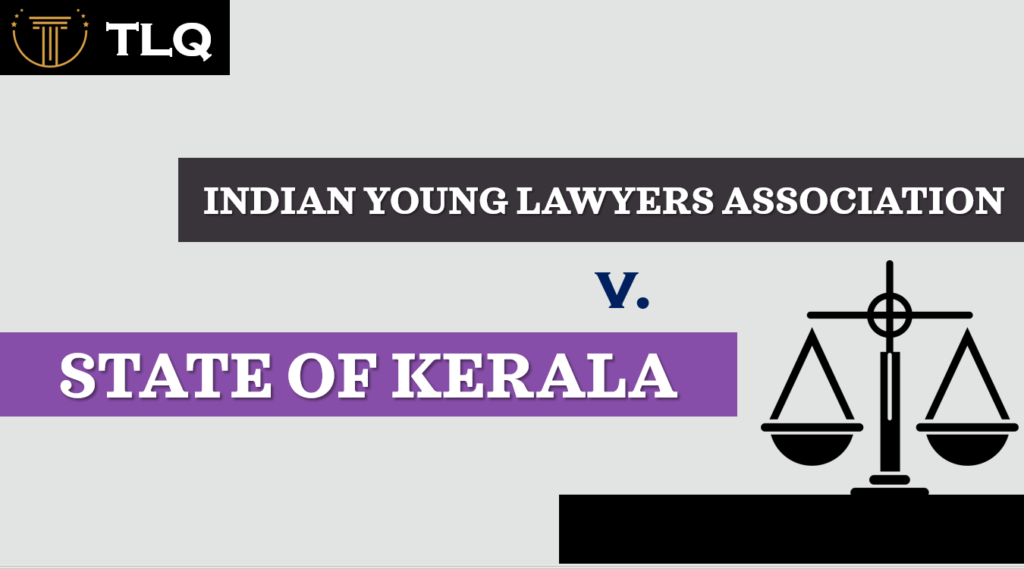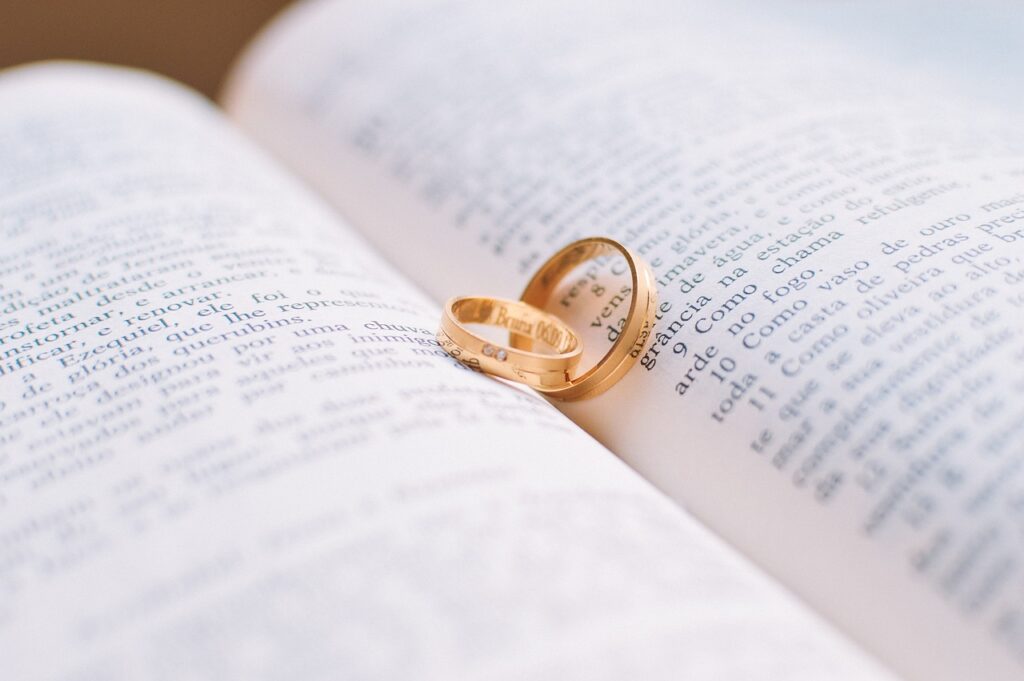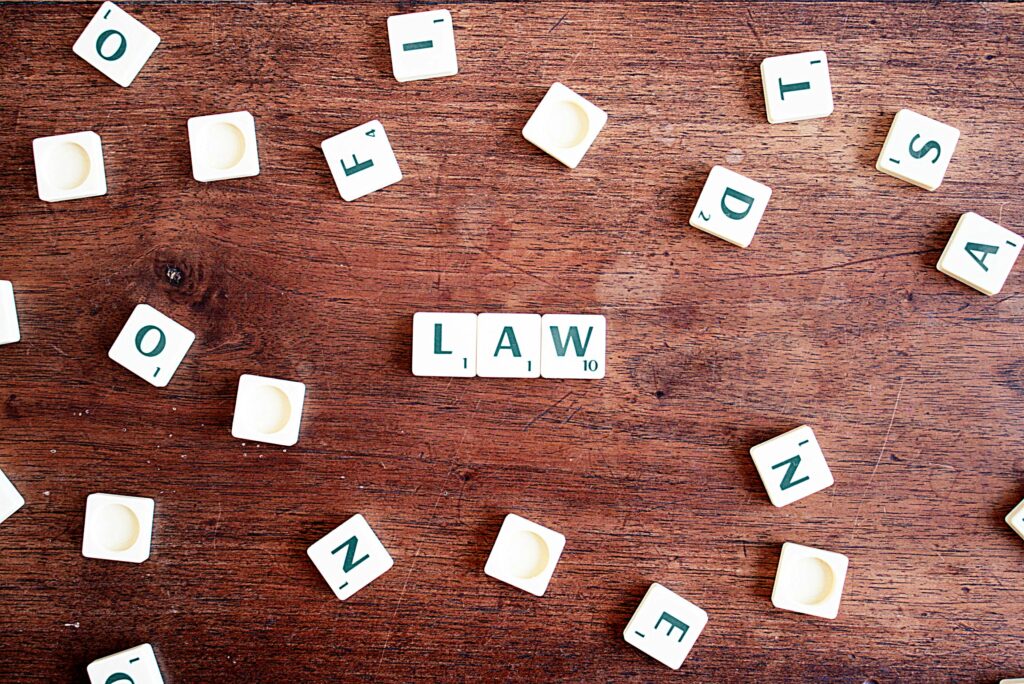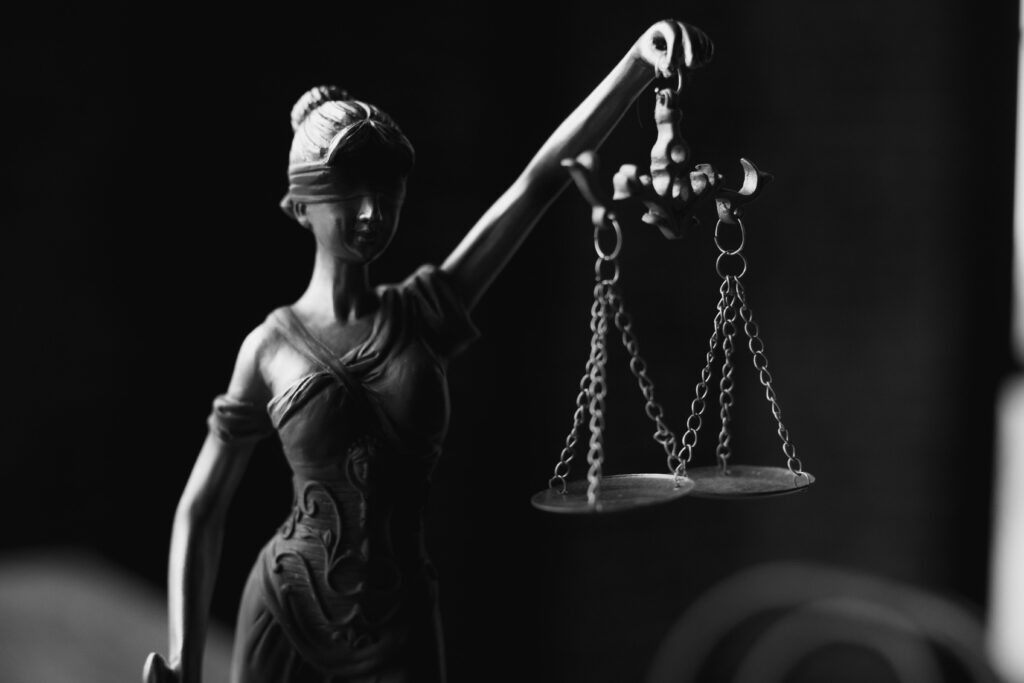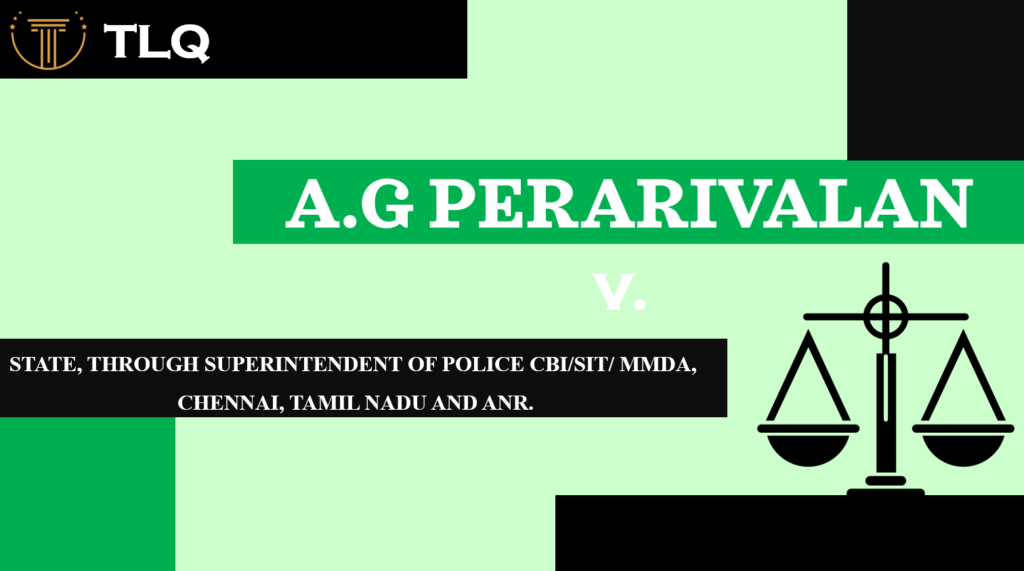Published On: 13th April, 2024

Authored By: Aarush Sharma
JIMSEMTC, Department of Law (Affiliated to GGSIPU)
INTRODUCTION:
The case Indian Young Lawyers Association v. State of Kerala [Writ Petition (Civil) No. 373 of 2006] stands as a pivotal moment in Indian legal history, addressing the complicated interaction among spiritual traditions and constitutional rights. at the heart of this landmark case lies the contentious issue of gender discrimination within the realm of religious practices, especially regarding the centuries-old ban on ladies of menstruating age from coming into the Sabarimala temple in Kerala.
This case captivated the state’s attention as it opened up in the highest courtroom of the land, sparking heated debates and impassioned arguments from both aspects. On one hand, proponents of the traditional practice argued for the protection of religious customs and rituals deeply rooted in the cultural material of society. then again, advocates for gender equality and constitutional rights challenged the discriminatory nature of the temple’s entry restrictions, contending that they contravened the ideas of equality and non-discrimination enshrined within the Indian constitution, against this backdrop, the Supreme Court of India was tasked with weighing competing pastimes and rendering a judgment that might have a long way-reaching implications for religious freedoms, women’s rights, and the broader warfare for social justice in India. The court’s decision could not only decide the fate of the Sabarimala temple’s access rules but also set a precedent for future cases regarding the delicate balance between religious ideals and constitutional ensures.
In this commentary, we will delve into the intricacies of the Indian Younger Lawyers Association v. State of Kerala [Writ Petition (Civil) No. 373 of 2006] case, analyzing the arguments provided, the criminal standards invoked, and the implications of the court’s ruling. via a complete evaluation, we are trying to resolve the complexities of this landmark case and explore its broader importance in shaping the contours of Indian law and society.
FACTS OF THE CASE:
The Indian Young Lawyers Association v. State of Kerala [Writ Petition (Civil) No. 373 of 2006] case revolves around the longstanding way of life at the Sabarimala temple in Kerala, India, which prohibited women of menstruating age (normally among 10 and 50 years old) from entering its premises. here are the key facts of the case:
Sabarimala Temple: The Sabarimala temple, located in the Periyar Tiger Reserve in Kerala, is devoted to Lord Ayyappa, a Hindu deity respected by way of tens of millions of devotees throughout South India.
Menstruating Women Ban: Historically, the temple authorities enforced a centuries-vintage custom that barred women of menstruating age from entering the temple premises. This restriction was justified on the grounds that Lord Ayyappa is considered to be celibate, and the presence of menstruating women was believed to violate his celibacy.
Petition by Indian Young Lawyers Association: The Indian Young Lawyers Association, a group of young lawyers advocating for gender equality and social justice, filed a petition challenging the prohibition on women’s entry into the Sabarimala temple. They argued that the practice violated the fundamental rights of women assured under the Indian constitution, which includes the right to equality and freedom of religion.
Constitutional Challenge: The petitioners contended that the ban on women of menstruating age was discriminatory and arbitrary, perpetuating gender stereotypes and denying women equal access to religious worship. They argued that such discrimination based totally on biological elements was unconstitutional and violated the principles of equality and non-discrimination enshrined in the Indian constitution.
State of Kerala’s Response: The state of Kerala, representing the temple authorities and the government, defended the culture of barring women of menstruating age from entering the Sabarimala temple. They argued that the practice was a vital aspect of the temple’s religious ideals and rituals, covered under the right to freedom of religion assured by the constitution.
Supreme Court’s Intervention: The case subsequently reached the Supreme Court of India, which heard arguments from both sides and deliberated on the constitutional validity of the practice. The court’s decision could have far-reaching implications for religious freedoms, gender equality, and the interpretation of constitutional rights in India.
This information formed the basis of the legal dispute in the Indian Young Lawyers Association v. State of Kerala [Writ Petition (Civil) No. 373 of 2006] case, setting the level for a landmark judgment that could form the trajectory of Indian law and society.
ISSUES OF THE CASE:
The Indian Young Lawyers Association v. State of Kerala [Writ Petition (Civil) No. 373 of 2006] case involved several crucial legal and constitutional issues that the Supreme Court of India had to address. here are the key issues raised in the case:
Constitutional Validity of entry restrictions: The primary issue changed into whether or not the traditional practice of barring women of menstruating age from entering the Sabarimala temple turned into constitutional. This raised questions on the compatibility of religious customs with the fundamental rights assured by the Indian constitution.
Right to Equality: The case raised concerns about gender equality and discrimination primarily based on biological elements. It questioned whether the temple’s access regulations violated the right to equality enshrined in Articles 14 and 15 of the Indian constitution by treating women in a different way based entirely on their gender and age.
Freedom of Religion vs. Fundamental Rights: The case highlighted the anxiety among the right to freedom of religion, covered under Article 25 of the Indian constitution, and different fundamental rights, which include the right to equality and non-discrimination. It explored the volume to which religious practices may be exempted from constitutional scrutiny.
Essential Religious Practices Doctrine: The problem of whether the prohibition on women’s entry into the Sabarimala temple constituted an essential religious practice came into question. The court had to decide whether this practice became necessary to the temple’s religious ideals and rituals, warranting safety beneath Article 25.
Judicial review of Religious Customs: The case raised broader questions about the judiciary’s role in reviewing and adjudicating matters related to religious customs and practices. It explored the boundaries of judicial intervention in spiritual matters while ensuring the safety of fundamental rights guaranteed under the Constitution.
Cultural and Religious Sensitivities: The case also involved considerations of cultural and religious sensitivities associated with the Sabarimala temple and its traditions. The court needed to balance these sensitivities with the vital of upholding constitutional ideas and ensuring gender equality.
These issues were valuable to the legal dispute in the Indian Young Lawyers Association v. State of Kerala (2018) case and required careful examination and deliberation with the aid of the Supreme Court to reach a just and equitable decision.
ARGUMENTS ADVANCED:
Petitioner Side: In the case of Indian Young Lawyers Association v. State of Kerala [Writ Petition (Civil) No. 373 of 2006], the petitioners vehemently challenged the centuries-old practice of barring women of menstruating age from entering the Sabarimala temple. They argued that this exclusionary practice infringed upon the fundamental rights assured under the Indian constitution, especially the rights to equality and non-discrimination enshrined in Articles 14 and 15. The petitioners contended that such a discriminatory remedy based solely on gender and biological elements perpetuated regressive gender stereotypes and undermined the dignity and autonomy of women. They emphasized the precept of constitutional morality, putting forward that religious customs and practices need to evolve in accordance with the revolutionary values of the Constitution. moreover, the petitioners underscored the broader public interest in promoting gender equality and social justice, urging the court to intervene to rectify historical injustices and pave the manner for a greater inclusive and egalitarian society. Their argument resonated with the spirit of constitutionalism, advocating for a harmonious interpretation of religious freedoms and fundamental rights that prioritizes equality and dignity for all people, irrespective of gender. overall, the petitioners presented a compelling case grounded in constitutional principles, social justice, and the vital of upholding fundamental rights, in search of to task entrenched patriarchal norms and strengthen the purpose of gender equality in Indian society.
Respondent Side: The respondents, representing the state of Kerala and the temple authorities, defended the conventional practice of barring women of menstruating age from entering the Sabarimala temple. They argued that this practice was a crucial aspect of the temple’s religious ideals and rituals, deeply rooted in centuries-vintage traditions. The respondents contended that the prohibition on women’s entry was vital to keep the sanctity and celibate nature of the deity, Lord Ayyappa, whom devotees trust resides within the temple. They asserted that interfering with this religious custom might amount to undue intrusion into religious affairs and undermine the autonomy of religious establishments. moreover, the respondents highlighted the cultural and religious sensitivities related to the Sabarimala temple, emphasizing the significance of respecting those traditions as indispensable components of the Hindu faith and background. They recommended against enforcing outside norms and values on religious practices, arguing that such interference could disrupt the sensitive stability between religious freedoms and secular governance. overall, the respondents’ argument centered on the protection of religious autonomy and cultural heritage, advocating for the protection of traditional customs according to the religious beliefs and sentiments of devotees.
RATIO DECIDENDI:
The Supreme Court held that the prohibition on women of menstruating age from entering the Sabarimala temple constituted unjustifiable discrimination based on gender and biological elements, consequently contravening the principles of equality enshrined in Articles 14 and 15 of the Indian constitution. by emphasizing the supremacy of constitutional morality over religious customs, the court established that religious freedoms are not absolute and should be subject to reasonable regulations to ensure the protection of fundamental rights. The judgment clarified that whilst religious practices are entitled to admiration and protection, they cannot be exempt from constitutional scrutiny after they perpetuate discrimination or undermine individual dignity. furthermore, the court’s ruling underscored the judiciary’s authority to review and adjudicate subjects regarding religious practices, especially after they infringe upon fundamental rights guaranteed via the constitution. overall, the ratio decidendi of the case represents a significant reaffirmation of constitutional concepts and the rule of regulation in upholding gender equality and protecting individual rights in India’s various and pluralistic society.
COMMENT:
The arguments presented by both the petitioners and respondents in the Indian Young Lawyers Association v. State of Kerala [Writ Petition (Civil) No. 373 of 2006] case encapsulate the complex interplay between religious traditions and constitutional principles in India. While the petitioners eloquently advocated for gender equality and the protection of fundamental rights, the respondents staunchly defended the religious autonomy and cultural heritage associated with the Sabarimala temple. The case underscores the broader societal debate over the extent to which religious practices should be subject to constitutional scrutiny and the imperative of balancing religious freedoms with the protection of individual rights. Ultimately, the Supreme Court’s judgment in this case represents a delicate balancing act, affirming the principles of equality and non-discrimination while also acknowledging the importance of religious autonomy and cultural sensitivity. It serves as a reminder of the evolving nature of Indian law and the ongoing quest for harmony between religious traditions and constitutional values in a diverse and pluralistic society.
CONCLUSION:
The conclusion drawn from the Indian Young Lawyers Association v. State of Kerala [Writ Petition (Civil) No. 373 of 2006] case reflects a pivotal moment in Indian legal history, marking a significant step towards achieving gender equality and upholding constitutional values. Through its landmark judgment, the Supreme Court of India reaffirmed the principle that no religious practice or tradition can justify discrimination or infringe upon fundamental rights guaranteed by the Constitution. By striking down the prohibition on women of menstruating age from entering the Sabarimala temple, the court underscored the importance of equality and non-discrimination as foundational principles of Indian democracy. This decision represents a triumph for gender justice, as it dismantles centuries-old barriers that have marginalized women and perpetuated patriarchal norms in religious spaces. Moreover, the judgment serves as a powerful reaffirmation of the judiciary’s role as the guardian of the Constitution, entrusted with the responsibility of upholding the rule of law and protecting individual rights. It sends a clear message that religious freedoms are not absolute and must be balanced with constitutional imperatives to ensure justice and equality for all citizens. Furthermore, the case highlights the ongoing evolution of Indian society toward a more inclusive and egalitarian future, where diversity is celebrated and fundamental rights are respected. In conclusion, the Indian Young Lawyers Association v. State of Kerala (2018) case stands as a landmark decision that reaffirms the principles of equality, justice, and dignity enshrined in the Indian Constitution, setting a powerful precedent for future legal battles in the pursuit of social justice and human rights.

